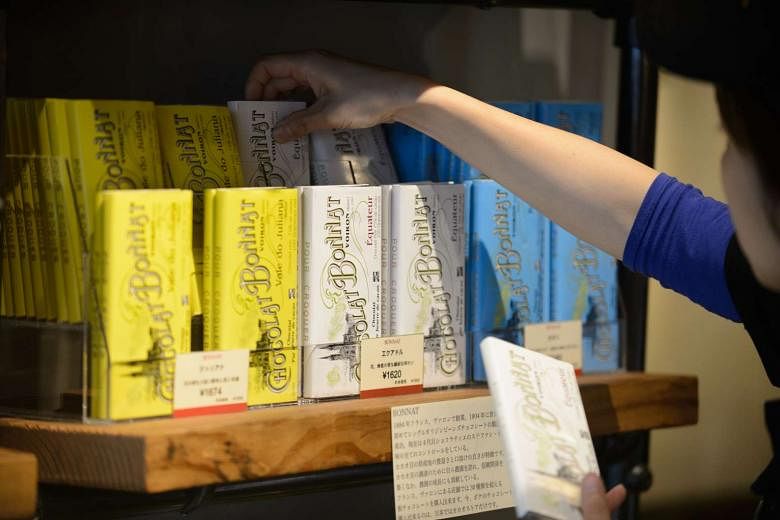TOKYO • Naoko Otsuka did not think twice about paying the equivalent of US$23 (S$33) for 140g of chocolate. The dark-brown slivers of sweetness were not just a treat, the Japanese housewife said, but an opportunity to learn more about a superfood.
The six bars she bought from a store in the Shibuya shopping district were made by an artisan manufacturer each from a different batch of cocoa beans grown in Vietnam.
Ms Otsuka, 55, said: "I want to taste the difference between each bar. Before coming to this shop, I didn't know beans could taste different depending on their origin."
Priced at 17,500 yen (S$217) a kg, her purchases were about eight times dearer than supermarket- bought chocolates, often made from fewer cocoa beans supplied in bulk from various sources.
Consumers like Ms Otsuka are helping to drive demand for premium chocolates, a niche whose sales are outpacing the mass market dominated by companies such as Hershey and Cadbury owner Mondelez International.
Marou Chocolate, which made the bars Ms Otsuka bought, has doubled its sales in Japan every year since entering Asia's biggest chocolate market three years ago. That growth reflects increasing consumer demand for products that identify the source of their cocoa beans, said Mr Jonathan Parkman, co-head of agriculture at brokerage Marex Spectron Group in London.
Even Meiji Holdings, which began selling chocolate in Japan in 1918 and says it has a 23.8 per cent hold on the domestic market, began offering bean-to-bar lines - made with cocoa from Brazil and Venezuela - in September 2014. Its namesake milk chocolates sell in supermarkets for about 2,200 yen a kg.
Mr Yuko Nakamura, a spokesman for Tokyo-based Meiji Co, said: "Bean-to-bar, started by artisan chocolate manufacturers, is a trend we cannot ignore. By adding it to our product lines, we want to catch new customers and expand sales."
In Japan, retail chocolate sales rose 7 per cent to 405 billion yen last year, even as the population declined, according to Euromonitor.
Growth has been supported by awareness of chocolate's micronutrients, especially polyphenols, which have helped establish it as a "healthy snack", the market researcher said.
Ms Otsuka said: "I love to eat chocolate with higher cocoa content, as it's healthy."
Mr Nakamura said: "We expect more and more consumers to take chocolate as a luxury, rather than as a food. They will taste it as they do when taking wine and coffee."
Chocolate maker Marou works closely with more than a dozen farmers in six provinces of Vietnam and finds that beans from each of them yields a distinctive flavour because of the unique combination of climate, soil, variety and fermentation process, said its chairman Samuel Maruta.
He said: "There are a lot of people interested in artisan chocolate in the US, which is something that didn't really exist 10 years ago."
BLOOMBERG

